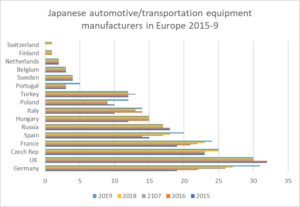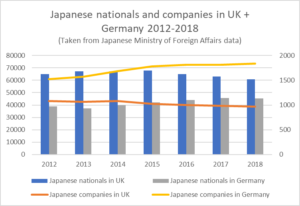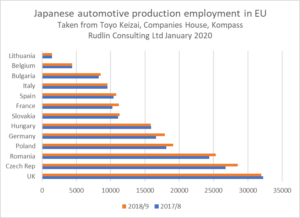Japanese companies in Ireland
I have been visiting Ireland about once a year recently for business, but also for family reasons. The business side is to provide training for companies there that have been acquired by a Japanese company, or in one case, had acquired a company in Japan via its US parent.
My parents also now live in Ireland. After 25 years’ working in Japan, they initially retired to France but never felt completely at home there. My stepfather’s father was Irish, so he has family in Ireland. It was also easy for my stepfather to get an Irish passport, as an insurance against Brexit so that he can continue to receive free healthcare and a state pension. My mother has become Danish for the same reason – and was able to do so because her father was Danish.
They now live close to my cousins, near the city of Cork, which has become a hotspot for technology companies, particularly American ones. Trend Micro and Alps have factories there, with the latter employing around 850 people making electronic components.
Cork also has a pharmaceuticals and biotech cluster, as does the capital of Ireland, Dublin, which is where Astellas and Takeda* have plants. Astellas employs over 400 people manufacturing raw materials and immunosuppressants and Takeda employs around 300 people making cancer therapies and active ingredients for various drugs. Ireland is the biggest net exporter of pharmaceuticals to the EU.
Multinationals are attracted to Ireland because of the young, well-educated, English speaking workforce, and also the very low corporate tax rate of 12.5%.
Aircraft leasing in particular has benefitted from Ireland’s low tax policies. Nine out of the ten top aircraft lessors are based in Ireland, and over half the world’s airplanes are owned and managed there. Japanese companies such as Orix Aviation and SMBC Aviation Capital have substantial operations in Dublin.
Locating operations in Ireland purely for tax reasons may turn out to be unsustainable in the long term however, as the EU, the OECD and Japan are all taking steps towards international tax cooperation and clamping down on tax avoidance.
The other risk to consider is of course Brexit. The UK forms a “land bridge” to the EU for Ireland. Around 85% of Ireland’s freight trade goes to British ports, and about 40% (around 190,000 freight containers a year) of that is re-exported to elsewhere in the EU.
Pharmaceuticals and electronic components are often shipped by air and various EU shipping companies have started up new routes connecting Ireland to the EU recently. So the main concern is any friction caused to trade that is only between the UK and Ireland.
This is partly why the land border between Northern Ireland and the Republic of Ireland has become the key issue for resolving Brexit. But the most important concern has nothing to do with business – there are many more families like mine, living in both countries, who do not want to lose the peaceful coexistence that the open border has brought with it.
This article by Pernille Rudlin was originally published in Japanese in the Teikoku Databank News on November 13 2019
*Takeda acquired Shire for $62bn in 2019, who relocated their HQ from the UK to Ireland in 2008 for tax reason. Takeda is now liquidating Shire Holdings in Ireland and transferring the assets to Takeda Ireland, to make repatriation of dividends to Japan easier – presumably avoiding Japan’s tax haven laws.
For more content like this, subscribe to the free Rudlin Consulting Newsletter. 最新の在欧日系企業の状況については無料の月刊Rudlin Consulting ニューズレターにご登録ください。
Read More


